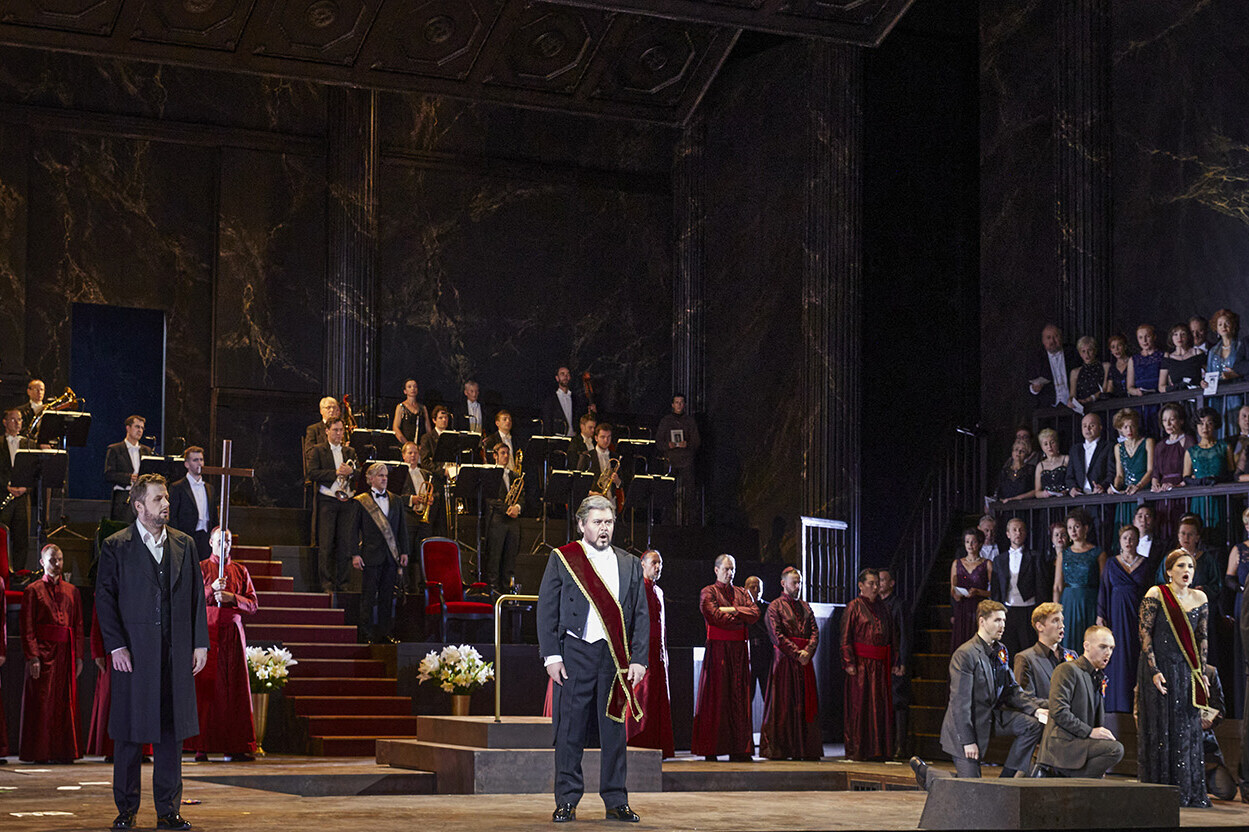Lyrical score and haunting drama
At the heart of Leoš Janáček’s passionate opera »Káťa Kabanová« is the conflict between the deep desire for personal freedom and social restrictions that are rooted in rigid tradition and...
Opera in three acts
Libretto by the composer
Performed in Czech with German and English supertitles
Premiere
28. April 2024
In brief
Lyrical score and haunting drama
At the heart of Leoš Janáček’s passionate opera »Káťa Kabanová« is the conflict between the deep desire for personal freedom and social restrictions that are rooted in rigid tradition and morality. In Calixto Bieito’s production, Káťa Kabanová becomes increasingly desperate as she tries to find her place in society; in the end, she is brutally rejected and driven to suicide.
Bieito says: »Everyone in the story is scrutinising the actions of others. All instances of fear, despair and loneliness are meticulously registered and, if necessary, mercilessly exploited. This leads to Kafkaesque situations that have a deadly impact on real-life events.«
In »Káťa Kabanová«, which premiered in Brno in 1921, Janáček once again succeeded in creating an intimate musical language for this uniquely tender and lyrical composition, in which the orchestra sensitively expresses the emotional states of the various characters
Storyline
Act 1
The teacher Váňa Kudrjáš revels in the view of the river Volga. The peaceful afternoon atmosphere is disturbed by a quarrel between the brusque and self-confident merchant Dikoj and his nephew Boris. After Dikoj has left, Boris explains to Kudrjáš why they argued: according to his late grandmother’s will, he must respect his boorish uncle, otherwise he and his sister will not be able to collect their share of the inheritance once they have come of age. The Kabanov family return from church. Boris goes on to tell Kudrjáš that he is in love with Káťa, the young wife of Tichon Kabanov. Kudrjáš warns Boris not to harm Káťa. The old widow Kabanová (Kabanicha) complains that since his marriage to Káťa her son Tichon has paid more attention to his wife than to his mother. A weakling, Tichon then speaks to Varvara, the family’s foster daughter, to whom Káťa is like a sister. She rebukes Tichon for pestering his wife, although insisting that he loves her. At Kabanov’s house, Káťa tells Varvara about her happy childhood, about the dreams in which she was flying. In desperation, she confesses that she loves a man other than her husband, in spite of realising that it is a sin. Tichon comes in to say good-bye, since he is to travel to Kazan on business, as his mother ordered him to do. Káťa beseeches him to take her with him, yet Tichon refuses. She then asks him to make her swear not to speak to or look at any strangers during his absence. Kabanicha enjoins her son to instruct Káťa how to behave while he is away. Tichon dutifully obeys him mother and abruptly leaves.
Act 2
Kabanicha upbraids Káťa for not being sufficiently sorrowful at her husband’s absence. After she has left, Varvara shows Káťa the key from the garden gate through which she can escape, adding that when she sees Boris she will instruct him to wait for Káťa there. Overwhelmed by desire, Káťa steps out as evening falls. The drunken Dikoj visits Kabanicha, trying to win her favour, yet the woman dismisses him. Kudrjáš is waiting for Varvara. His friend Boris appears out of the blue after receiving a message from an unknown girl to go to the same spot. Boris reveals to Kudrjáš his affection for Káťa, adding that he does not know whether she is keen on him. Varvara and Kudrjáš go for a walk by the river. Káťa soon emerges. First keeping her distance, after Boris has declared his love for her she reciprocates by confessing her secret feelings for him. Yet Káťa is fully aware that she will pay dearly for her moments of happiness with Boris.
Act 3
Kudrjáš takes shelter in a dilapidated building before an approaching storm. He is joined by Dikoj, who is frightened. Kudrjáš tries to calm him, referring to a new invention, the lightning rod. This, however, infuriates Dikoj, who insists that lightning is not a discharge of electricity but God’s punishment. Káťa arrives with Tichon and Kabanicha. Distraught and crushed by guilt, Káťa confesses to having met with Boris during Tichon’s absence and presently falls into her husband’s arms. But she then frees herself and runs out into the storm. By the Volga, Tichon and the servant Glaša seek Káťa in the dark. Kudrjáš and Varvara decide to leave for Moscow and start a new life. Káťa staggers along the river. Instead of bringing relief, her confession has dishonoured her and humiliated Boris. But she wants to see Boris one more time so as to assure him of her deep love. Upon hearing her call, Boris runs towards her, and they embrace. Boris tells Káťa that his uncle is sending him to Siberia on business. Unable to think straight, Káťa finally bids farewell to Boris. Slowly approaching the river, Káťa imagines birds and flowers on her grave. After achieving momentary calm, she throws herself into the Volga. Tichon wants to save his wife, but Kabanicha restrains him. He then blames his mother for Káťa’s suicide. After Dikoj has brought Káťa’s body, Tichon wildly laments his dead wife. Evidently unmoved, Kabanicha ceremoniously bows to the terrified bystanders and thanks them for their help.











